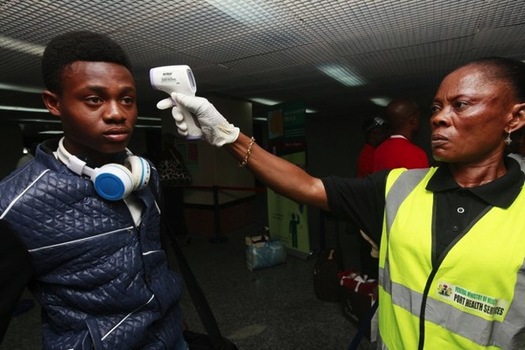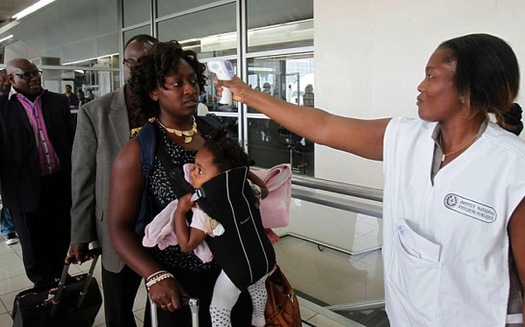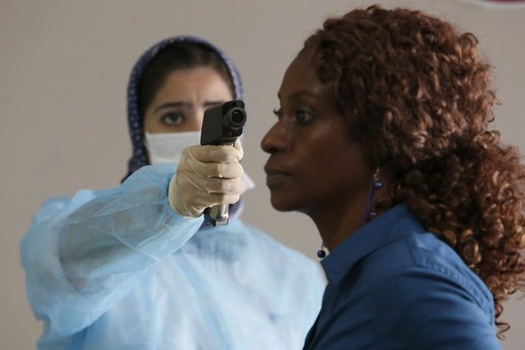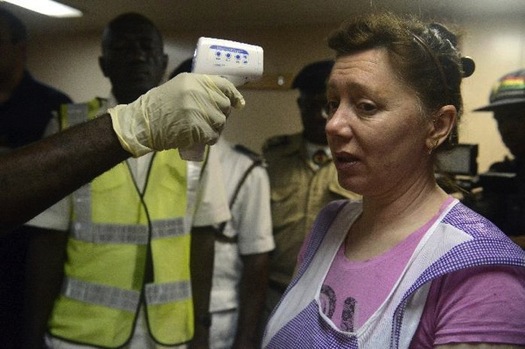Have you noticed the pictures of African health officials using handheld thermometers suddenly springing up in US news stories and photo galleries? I found the picture above in the Charlotte Observer's Daily Edit. Most assuredly, this airport official is applying her job with the utmost seriousness. Far from what we would imagine in our minds as a health worker operating in a compassionate and protective way, however, the scene more easily evokes extreme prejudice (in both meanings of the term) and is more consistent with a still from a criminal or gangster movie. (It's no surprise, by the way, how the Obama haters latched on to a similarly unnerving photo if you saw our "Obola" post on Monday.)
Here are a few other examples I came across last night:
The expression of the health worker, surprisingly similar to the previous one, again feels tense, icy, "cold blooded" with the mother seeming to recoil.
This one, involving a Moroccan woman with a headscarf, her one eye blocked and the expression of the other woman looking steeled and resigned, has a more cinematic association to terrorism.
Beyond the disembodied hand, the dispassionate guy in the yellow vest, and then the guy in the military uniform, the white woman turning her gaze away has the sense of "Any last words?"
Given the "loaded nature" of the objects and the situation, there are certainly ways to capture a scene like this that is not only more sensitive (and more mundane), but steers clear of exploitive associations to race and violence. But then, judging from these photographs selectively chosen to run on the major mainstream news sites, editors surely appreciate that these not-close-to-routine looking images -- if easy to rationalize under the story of a health care emergency -- are going to get a rise.
Playing on violent and dramatic stereotypes of Africa and African-Americans, what we're seeing here qualifies as barely veiled racism.
----------BagNewsNotes: Today's media images analyzed. Topping LIFE.com's Best Photo Blogs, follow us at BAG Twitter, BAG Facebook and BAG via email.
(photo 1: Luc Gnago/Reuters caption: A health worker takes a passenger's temperature with an infrared digital laser. photo 2: Sunday Alamba/AP. caption: Health port officials uses a thermometer to screen passengers at the arrival hall of Murtala Mohammed International airport in Lagos, Nigeria Monday, Oct. 20, 2014. Water laced with salt and sugar, and gallons of the nasty tasting stuff. ThatÕs what doctors who survived Ebola in Nigeria are crediting for their survival. On Monday, the World Health Organization announced a rare victory in the months-long battle against the killer disease, declaring Nigeria is Ebola-free. photo 3: Abdeljalil Bounhar/AP Photo/The Canadian Press caption: A Moroccan health worker uses a thermometer to screen a passenger at the arrivals hall of the Mohammed V airport in Casablanca, on Thursday, Oct 9, 2014. Airline passengers arriving in the U.S. from three West African countries will face temperature checks using no-touch thermometers and other screening measures at five American airports, starting with New York's Kennedy on Saturday, Oct. 10, 2014. photo 4: VPC caption: Five of America's biggest airports will begin to implement new steps to guard against Ebola, requiring travelers arriving from the West African nations to go through an additional layer of screening.)



